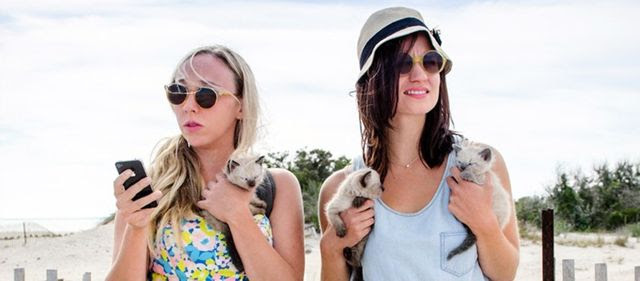 Back to selection
Back to selection
Five Questions With Fort Tilden Directors Sarah-Violet Bliss and Charles Rogers
 Fort Tilden
Fort Tilden A comedy of errors through the borough of Brooklyn, Fort Tilden follows the aimlessly entitled Allie (Clare McNulty) and Harper (Bridey Elliott) on their quest for a day at the beach. What begins as a seemingly superfluous mission soon crumbles into a dismantling force on both the girls’ psyches and their relationship. Co-written and directed by feature first timers Sarah-Violet Bliss and Charles Rogers, Fort Tilden premieres today in the Narrative Competition at SXSW.
Filmmaker: This was your first time working together as co-writer/directors. How did that come about and what was it like sharing a brain for X months/years? We’re you always in agreement on set?
Sarah-Violet Bliss and Charles Rogers: We’d been friends throughout grad school and always really appreciated each other’s work. We both generally make comedies and have compatible voices so one day we were brainstorming about another project all together and found our way to this story. When we decided to make a feature film together everyone said, “Oh that makes sense!”
We really have been sharing a brain for the last nine months — the directing process was much like our writing process, everything was very fluid. We brought our own sensibilities to the film and that naturally evolved into its own tone. Working on set together was collaborative and it’s great to work with someone who knows the movie as intimately as you do. There were minor disagreements but always in the name of what’s best for the film.
Filmmaker: Fort Tilden follows a comedic, episodic format, where the protagonists’ attempts to get where they’re going are thwarted. Did you have any particular influences or touchstones for the structure?
Bliss and Rogers: We thought about movies that take place in one day like Ferris Bueller’s Day Off as well as road trip movies like Sideways. It was helpful for us to borrow from the traditional structures of these genres. In these types of films, the characters are up against both external and internal obstacles which is integral to their journey. We were inspired to explore that when making Fort Tilden.
Filmmaker: A lot of critiques about modern Brooklyn-based independent cinema stem from the fact that the films seem to concern the same perpetual adolescent, entitled females. Your thoughts on that? Why are such characters so exciting to explore?
Bliss and Rogers: If anything, we were interested in writing about the hypocrisies of privilege and what it looks like when these types of characters extend themselves outside of their bubble. Fort Tilden addresses the uncomfortable and truthful aspects of this generation’s perceived irresponsibility. Harper and Allie’s problems are presented in a humorous light, but they are valid. However, that doesn’t excuse them from their participation in “millennial malaise.”
Filmmaker: You’ve assembled a really strong cast for a debut feature, with actors who are, on the whole, just starting out. Did you bring them in to play off one another? Even in the shorter, one-off scenes, the chemistry is key.
Bliss and Rogers: We invited Clare and Bridey to dinner in Chinatown so we could all bond and it was really obvious that we had the right girls. Because of our time constraints, we only rehearsed with the leads, but we never had to stress about trusting our ensemble. We’re both lucky in that we are connected to a lot of great, funny actors. They are people we are friends with, people we knew we’ve always wanted to work with, and people we discovered along the way.
Filmmaker: The later third of the film explores the consequences — both innocuous and more significant — of the girls’ behavior in perhaps a darker way than is initially expected. Was this tonal shift necessary to elevate the film from a clever satire or just to provide a more holistic view of the characters?
Bliss and Rogers: It felt right for the girls to suffer a little bit. It was important for them to not get away with their immaturity. Because their day trip exposes their darker traits, they come home with a bruised view of themselves. We really like where the third act takes the characters. There’s simultaneously a sense of hope and loss and the overall comedy elevates the meaningfulness of their struggle.
